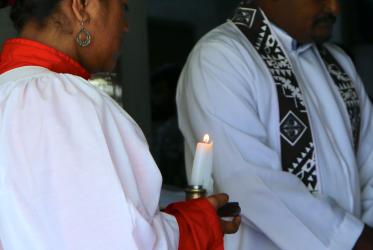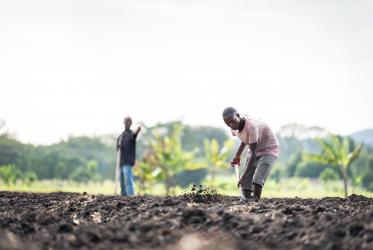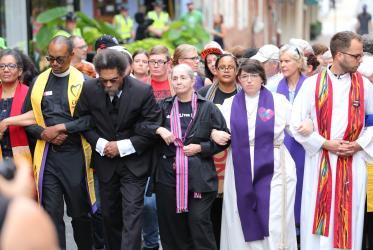AGAPE Consultation, 5 November 2007
More on the 5-9 November 2007 ecumenical consultation in Dar es Salaam
More information on the WCC and Poverty, wealth and ecology
Read a working paper on the study process
For an "Ubuntu" experience in global economy
Report from Dar Es Salaam by Marcelo Schneider
The African concept of ubuntu, a Swahili word describing the awareness of community, mutual commitment and care among community members, was used as the framework for the theological reflections of the first two sessions of the AGAPE (Alternative Globalization Addressing People and Earth) consultation being held in Dar Es Salaam this week.
"There is a threefold understanding of mutual commitment emerging from our reflections, based on the concepts of ubuntu, which we translate as humaneness, ugamaa (life in community) and uzima (life in its fullness)", stated the WCC programme executive for Poverty, Wealth and Ecology: impact of economic globalization, Dr. Rogate Mshana.
The consultation is the first of a series of regional consultations during the next seven years on economic globalization. They are being organized by the WCC Public Witness programme.
The consultation is a continuation of the AGAPE process which began at the WCC Assembly held in Harare in 1998, culminating in the AGAPE Call presented at the assembly in Porto Alegre in 2006.
The AGAPE Call invites churches to act together for transformation of socio-economic injustice and to continue analyzing, reflecting and acting on the challenges posed by economic globalization and the links between poverty, wealth and ecology.
From Harare to Porto Alegre, it remained clear that the world has hardly addressed the issue of socio-economic justice in any meaningful way, especially in Africa, where poverty and inequality and the gap between the rich and poor have intensified, with destructive consequences for peace and for the environment.
At the Porto Alegre assembly two main views on economic globalization emerged. The first emphasized practical reforms within the neo-liberal economic paradigm.
The second saw this same paradigm as causing poverty for many and creating extreme wealth for a few. It called for a radical change of the paradigm in order to achieve poverty eradication, equitable resource-sharing and ecological sustainability.
The 40 some participants gathered at the consultation are divided into three groups of preparatory hearings focusing on the continuation process of AGAPE including:
Theological reflection on poverty, wealth and ecology and its links with just peace:
- An African theological discourse on poverty, wealth and ecology drawn from the "Ubuntu" and other similar concepts in Africa exploring the terms, "greed" and "contentment."
- Other theological discourses from Asia, Caribbean and Europe on linking poverty, wealth and ecology. How do they contribute to the African perspectives?
- The theology of peace in the market and the concept of African "Sokoni."
Women's perspectives on poverty wealth and ecology in Africa:
- Towards an African feminist theological discourse on poverty, wealth and ecology.
- Wealth-poverty linkages from a feminist perspective.
- Economy-ecology linkages from a feminist perspective.
- Harvesting stories of hope.
Youth perspectives on poverty, wealth and ecology in Africa:
- the neo-liberal paradigm, effect on youth in regard to poverty, wealth and ecology.
- youth responses to economic globalization.
- youth, poverty and migration in context of globalization.
The main objectives of the Dar Es Salaam consultation are to share church perspectives and practices on the causes of, and ways of tackling poverty, inequality, and environmental destruction.
They will also discuss a theological framework for studying the links between poverty, wealth and ecology within the context of the AGAPE process and the International Ecumenical Peace Convocation (IEPC) which is to be held in 2011.
The group will outline benchmarks for establishing a "greed line" in Africa as guidance to Christians. It will also discuss the findings of the Study on Poverty, Wealth and Ecology in Africa and look at perspectives from women and youth on the links between poverty, wealth and ecology in Africa will be held.
The goal of the consultation will be to develop joint church strategies and actions for addressing the interlinked problems of poverty, excessive wealth, and ecological degradation in Africa.
While the ecumenical family has acknowledged that poverty and inequality are pressing concerns and that environmental destruction is escalating, there is an urgent need to build and strengthen consensus on the causes of and ways to deal with these interlinked crises.




